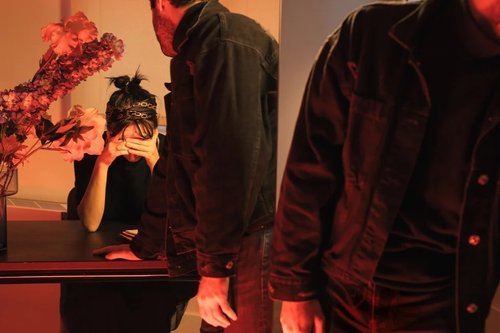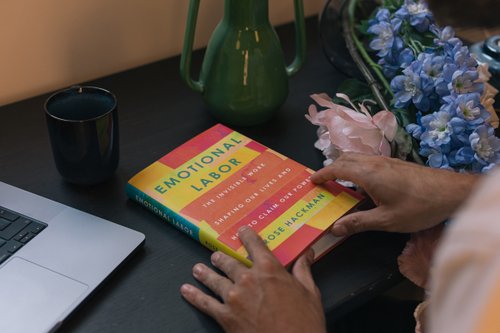‘We need each other’: Monika Jiang on combating loneliness in hybrid work
19. 12. 2024
11 min.


Journalist
The opportunity to work remotely a few days a week is a perk that many are grateful to have. Whether it means less time on a draining commute, or more time to spend with the family, there are plenty of advantages. If working from home alone or in a shared space aids productivity, it can also lead to feelings of loneliness and isolation. There are no colleagues to chat with during your coffee break at home. Even when you go to the office, you may find yourself alone, wandering around a cold, empty space with your laptop.
Monika Jiang sees modern loneliness as a “personal and collective crisis, which has a profound impact on health, relationships, workplace culture, and society.” But Jiang believes these feelings are not to be feared but should be recognized as a way to tap into our humanity. Jiang became interested in this idea when she was head of curation and community at The House of Beautiful Business, which works with companies to “shape a more humane future for business and society.” The writer, facilitator, and community builder now helps people cultivate their connection skills in third spaces, which can involve physical or virtual gatherings.
What gave you the idea to leave your job in 2023 and set up third spaces?
When I was at The House of Beautiful Business, I noticed there was a hunger and need for these kinds of spaces, and a desire to connect on a deeper level and to show up in a way that would be more authentic, not just a performance.
Participants in our events said they felt less alone in the spaces that we created. That made me really curious about what lies underneath this hunger and this desire to connect differently. What is modern loneliness?
For some years, we’ve been moving apart from one another as everything becomes polarized. I wondered if loneliness had anything to do with that and whether there was a structural, political angle to loneliness. Of course, it does and there is.
You mentioned in your newsletter that loneliness and being alone are not the same. You can feel more lonely in a city surrounded by people than you might on your own in nature. Why is that?
The feeling of disconnection and loneliness plays out in many ways. For some, it might be a feeling of being misunderstood, explicitly excluded, or that they’re different, an outsider.
If you live in a city where everybody seems to be going somewhere, or you’re at an event surrounded by a lot of buzz, you can feel unimportant. You feel insignificant, which is not necessarily negative, but it can put us in touch with the awareness of that disconnection and that loneliness versus being alone. If you’re physically isolated, you can still feel connected to yourself or to nature, or to something larger that makes you feel less disconnected.
So it’s not just being alone working remotely that leads to loneliness?
There’s a narrative around this: “Oh, people are feeling increasingly lonely at work because of remote work and hybrid work.” And that is partly true. I believe in the importance of in-person connection and shared spaces. At the same time, there’s a reason people don’t want to go back to the office. Work environments and spaces have not been nourishing or fulfilling a purpose beyond getting people into one place and controlling whether they’re working and being productive.
There’s something to be said for rethinking and redesigning physical spaces, including the office. We can ask: What is the office really for? How do we design it? How do we create a culture where people want to be and want to meet? Research shows that those who have a best friend at work are more productive, resilient, patient, and forgiving. Even if they’re not happy with the company, they may stay if they have a friend there.
It makes sense. Ultimately, we’re humans and it’s the relationships that count, not just salary and benefits. If I have someone to vent to about things that are not going well and there’s somebody to say, “I get it. The project is really stressful,” at least I know I’m not alone. The opposite is feeling like you can’t talk to anyone because everything has to be positive.
You can say you’re super busy, but you can’t admit to weakness. This culture of busyness is a huge factor in why people are feeling lonely—because they’re not facing that feeling, they keep distracted and busy.
Why can’t we just ignore these feelings, get on with our jobs, and have friends outside of work?
Work has become a predominant place for people to look for meaning, self-worth, and validation, and that’s partly the problem. It has become central to our lives, which is contributing to the fact that people are feeling more isolated and lonely.
You see that in high burnout rates and other mental health issues. Younger generations, Gen Z in particular, but also Millennials are disengaged and unmotivated.
There needs to be nuance and balance. Work is important but if we were to decenter it in our lives that would contribute to our well-being.
“People are proud to say, “Oh, my calendar is so full. I don’t know when I can fit you in.””
You have written about the culture of individualism. Is admitting to being lonely or needing people seen as a weakness at work?
Yes. That’s at the core of it. It’s about individual success, and therefore it’s all about competition. In the workplace, that’s exacerbated. Even if we’re working in a team, there’s competition between team members, between different teams, departments, and markets.
Competition, and the idea there has to be a winner and a loser, feeds into the idea that we have to grow exponentially. We have to extract as much value as possible. We must work as hard as we can. People are proud to say, “Oh, my calendar is so full. I don’t know when I can fit you in.”
That’s why it’s hard to admit you don’t have everything under control, you don’t know where you’re going, you don’t have a strategy, you don’t have the skills, or you feel overwhelmed. Or you’d just like to talk to people sometimes.
We need support. We need conversation. We’re not machines. Yet we’re still striving to be machines, rather than humans.
If you’re a hybrid worker, how do you know if you’re lonely or if you just need a little more human contact?
Everyone feels loneliness differently, but there is a common thread: You notice that you’re increasingly shutting down, withdrawing, and isolating yourself.
Instead of thinking, “Oh, I’m lonely. I must get out and meet people,” you do the opposite. You get anxious at the idea of seeing anyone. You retreat more and more. You don’t go to events. You don’t contact colleagues. You feel anxious about asking for support. This is usually a sign.
But you can ask yourself: “What am I feeling? What do I need? Is it emotional support? Do I feel overwhelmed? Do I need closeness or intimacy?”
You may long for true intimacy in a personal relationship or it may be social loneliness, where you simply want to feel seen and heard on a day-to-day level. Little physical interactions are important. They help us feel like we’re part of society—even if it’s just micro-interactions like going to a coffee shop, buying flowers, or talking to a neighbor.
You can also look at the ratio between online and in-person meetings. You may talk to colleagues and others online regularly and feel fine, but it shouldn’t account for the bulk of your interactions.
I look at it as three levels: disconnection from self, disconnection from other people, or disconnection from something bigger. That last is quite open. For some, it might be something spiritual or religious, a connection to something larger. You can feel lonely when you’re seeking to be part of something greater.
Some hybrid workers seem happy alone. Do some people need less human contact?
Some people are very comfortable with their own company. This is an essential part of coping with loneliness because, if you can be with yourself, even when it’s tough, you can give yourself care and compassion.
At the same time, these people have a tendency to rely on themselves. They need to practice asking for help, even if they feel they don’t need it so they can enjoy their aloneness but also have quality time with others.
For example, neurodivergent people usually need alone time to regulate, to come back, to themselves, and that helps them to connect again with others.
Some other people get a lot of energy from being in the company of others. They can try to spend a little more time alone, caring for themselves and not only looking for support from others, whether those are colleagues, family, or friends.
You mentioned in your newsletter that about 12% of people and 15% of men in the US say they have no close friends at all.
It’s a huge issue. There’s a direct link between how boys are being socialized, brought up with this idea of what it means to be a man in this patriarchial society—strength, competition, winning, not being weak. It’s about being ‘strong men’. They socialize by going to the pub, to see sports or concerts. Their only close relationships are with their partner.
This affects their mental health. We’re seeing men struggling with depression and anxiety. If we look at how men, in particular, are feeling and acting out these suppressed emotions, we can see that all of it has a relation to the feeling of disconnection and loneliness.
If we build a culture where men can be as human as we all want to be—showing the whole range of emotions and support and learning how to build relationships in a more diversified way and have a different kind of understanding of themselves—that wouldn’t be the case.
We’re feeling the backlash of many, many years of neglecting what’s happening inside of us, individually and collectively.
“Connection and culture shouldn’t get lost in a remote work scenario.”
Essentially, you’d like us to go back to our roots as humans. But what can a hybrid or remote worker do about this?
There are three things: get in touch with yourself, and get in touch with others outside and others inside your company.
First, you can ask yourself: “How can I become more mindful and conscious about my time spent in relationships with others online and offline? How can I vary my own environment?” If you spend eight hours a day in front of a computer, try not to spend your downtime looking at a screen. Get outside. You can design your life in a way that you become part of a community. Join a club. Go out with friends. Find social activities or volunteer. You don’t have to do everything. You might just take a walk in nature. Find a way to move. That’s hugely important.
Second, if it’s not possible to meet in person with your colleagues, or if you’re fully remote, you can look for co-working spaces, which act as neighborhood office slash living room spaces where remote workers are connecting.
Don’t just say “Hello,” put your laptop down and get to work. Invite others to socialize. You can say, “Hey, I’m gonna get a coffee. You want one? Let’s go together.” Try to build connections with other people who are struggling with the same things, or who might not be part of your company.
Third, make an effort to connect with others in your company, if you’re part of one. See how you can organize and ask for things and create spaces, whether they are online or in person. Connection and culture shouldn’t get lost in a remote work scenario. Ask your manager for help. It’s not just up to individuals to take responsibility for this, it’s up to the companies, but they need to be pushed.
So how can hybrid workers nurture connections with coworkers?
A lot of people are waiting for someone to take the initiative. So take the initiative. Don’t be discouraged by the first attempt or the second attempt to say, “Let’s connect for a virtual coffee break?” or “Let’s meet every Friday, nothing to do with work stuff, but just to chat or to share something we have learned.”
Or try one-on-one. Reach out to a colleague and ask them if they’d like to chat, but not about work. Try to be the person who wants to nurture the relationship without thinking, “Oh, this is another thing on my to-do list,” or “What am I going to get out of this?” We need these interactions.
That could be quite hard if you’re not used to it, right?
Yes, it’s easier when you meet someone in person to feel their energy and whether they’re interested. The point is always to find shared interests. But there needs to be a space for that. So if it’s just a work environment where nobody reveals anything about who they are as a person, it’s hard. We all feel the same, but you can be the person who sparks something.
What I’ve seen work is when one brave person puts out a little rant over a Slack channel, for example, saying, “Does anyone else feel like this?” Some will roll their eyes (with an emoji). Others will say, “Yeah, let’s do something. We all feel a little bit lonely or bored or isolated.”
Even venting and gossiping, which seem negative, can bring us together and lead to something more constructive.
“If you’re curious about something, you’ll be met with something meaningful.”
How can we maintain meaningful connections rather than superficial chats with colleagues when we’re hybrid?
In a hybrid scenario, you can be proactive, not only about online interactions but also by initiating ways to meet and make time for in-person connections. So schedule a lunch, but make sure there’s a little bit of space to spend time together that’s unstructured too. That can lead to conversations that can go in a different direction. So you need to make time and also to learn to ask better questions.
It’s not just about, “What are you working on these days?” You can also ask more personal questions, “What else is happening in your life? or “What do you love to do outside of this? How did you come to work in this space or in this industry? What sparked that? What was your path?”
The person can then decide how much they want to share. If you’re curious about something, you’ll be met with something meaningful. Then also be willing to share. You’re not an interviewer, but a friend. If we open up a little, others will open up a little bit. Then we can open a little bit more and they open a little bit more. That’s what leads to meaningful relationships.
You have to be patient and see it as a long-term thing, and not look for instant gratification. And maybe you will lose touch, and then regain contact, and you can build a connection again. Every relationship goes through different phases.
Do you have any other tips on creating stronger bonds with your team when you’re hybrid or remote?
With a team, it’s really about rituals, habits that bring people together, even if it’s online. Something like a mental health check-in on Slack to say, “How is everyone really doing?” Or you can make it a habit to share something meaningful at the beginning or end of meetings. You can have dedicated spaces, online and in person. This gives people safety in terms of what to expect and how to form relationships.
It’s not just about, “How did we perform last month?” but “Where do people need support?” Not only, “What are you working on? When will you finish it?” but “What do you need? Who do you need for that? How can we support you better? How could you feel more supported?” and “Is there anything else happening in your life?” You don’t have to explain what that might be, but share if something is affecting your well-being.
“We need each other, and we all want to care and to be cared for.”
How can we cope on a personal level with moments of loneliness?
Cultivating a level of self-awareness, emotional resilience, empathy, and compassion towards ourselves and others is crucial. Find self-care practices that work for you, whether it’s mindfulness or taking part in sports.
Practice gratitude daily. Realize that, even if you had a horrible day, there’s always something to be grateful for—even if it’s just being alive, having something to drink or to eat.
On a relational level, if we cultivate empathy, care, and compassion for others, that will help us to cope with moments of loneliness, because we realize that others feel stressed too. Nobody’s perfect. We need each other, and we all want to care and to be cared for. Volunteering has proven to be one of the most effective ways to feel less lonely because we want to give and we can give something. Being of service to the world gives us meaning and a sense of connection that goes beyond the human friendship or connection level, and that helps with loneliness.
Photo: Welcome to the Jungle
Follow Welcome to the Jungle on Facebook, LinkedIn, and Instagram and subscribe to our newsletter to get our latest articles every week!

Viac inšpirácie: Duševné zdravie

Struggling at work? Here are 3 steps to rebuilding your self-esteem
Low on confidence? Learn how reflection, recharging, and refocusing can help you rebuild self-esteem and thrive professionally.
27. 11. 2024

10 ways to beat the Sunday Scaries
Even people who love their jobs can experience the Sunday Scaries. Psychologist Karen Doll offers several strategies to help manage and overcome it.
12. 9. 2024

Unpacking the burden of emotional labor
Rose Hackman’s "Emotional Labor" reveals how managing emotions impacts everyone, especially women and minorities.
08. 8. 2024

Is financial anxiety harming your productivity?
Feeling overwhelmed by financial anxiety? You're not alone. Discover practical steps and expert advice to regain control of your work-life balance.
31. 7. 2024

How to beat the post-PTO blues
Feeling down after a vacation is normal, but planning ahead and getting back into your routine can help beat those post-trip blues.
29. 7. 2024
Novinky, ktoré to vyriešia
Chcete držať krok s najnovšími článkami? Dvakrát týždenne môžete do svojej poštovej schránky dostávať zaujímavé príbehy, ponuky na práce a ďalšie tipy.

Hľadáte svoju ďalšiu pracovnú príležitosť?
Viac ako 200 000 kandidátov našlo prácu s Welcome to the Jungle
Preskúmať pracovné miesta